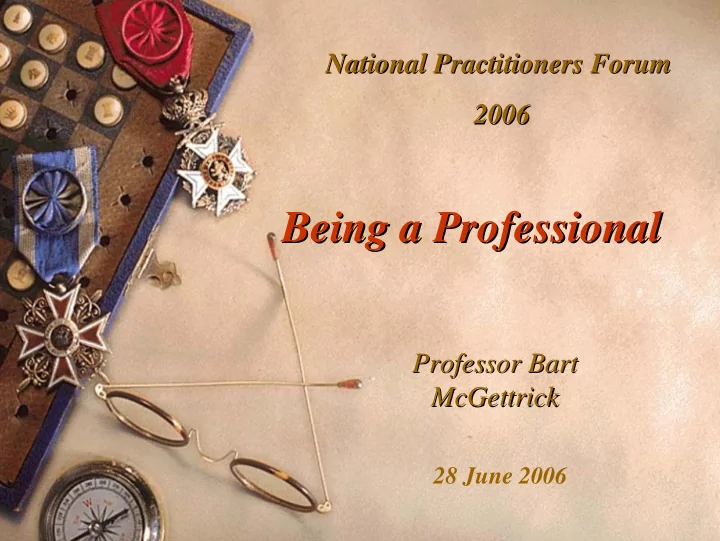

National Practitioners Forum National Practitioners Forum 2006 2006 Being a Professional Being a Professional Professor Bart Professor Bart McGettrick McGettrick 28 June 2006
In contemporary society the main function of the professions, including the social services is – The flourishing of humanity including and personal and social well-being and developing skills and understanding
The professions find their primary purposes in the hearts and minds of people … not in the papers and documents of a bureaucracy. They are fundamentally concerned with HOPE and JUSTICE FOR ALL Regulation follows values
Social care and community development have a moral purpose and dimension…always to improve society. All people are vulnerable and even fragile Professional people remember this
How do the social services serve the needs of society? Setting up agencies and places for the formation of the whole person … …healing places in society …places for individual human flourishing …places for the flourishing of all humanity and communities Healing places are happy places.
Professional Development Benchmarks Professional Values and Personal Commitment Experience Professional Skills Professional and Abilities Knowledge and Understanding
CPD is an integral part of being a professional person. Increasingly CPD is being undertaken in inter-professional settings, and this is valued for its own sake, since it offers insights to ways in which other professions operate. In recent years there has been a clear recognition that because of the pace of change within professions, all professional people ought to be actively engaged in continuous professional development. Who determines individual needs?
The Spirit of Teamwork The Spirit of Teamwork Teamwork within and between professions lies at the heart of our work. It is a powerful approach to shape action. It requires attention to the values and “spirit” that forms a unity in a group. There is a need to think about team facilitation… often meaning establishing those relationships and values that build capacity. The relationship between a team and the management structure is critical.
Different professions may, and do, have different value systems, and this can create difficulties in establishing and sustaining inter-professional working practices. It is an aspect of professional activity that will require considerable attention as inter- professional activities become more common and necessary in social services This will require professional education in inter-professional working. This will relate to increased emphasis on aspects of CPD.
Contemporary systems of accountability may be placing such demands on the individual that there is an orientation away from the social benefits of professions. There is a need to shift from “a culture of accountability” to “a culture of co a culture of co- -responsibility. responsibility.” ” “
Performance targets as a way of representing systems of accountability are often in conflict with what appear to be professional responsibilities. This assertion derives from the strong systems of accountability that are evident in contemporary professional settings. Where there is a culture of measurement and accountability there are always difficulties in finding reliable methods for setting targets and collecting evidence that meets professional and public needs or expectations.
There is evidence to suggest that a plateau is reached by seeking to raise “standards” through externally imposed change. Generally speaking measurement alone sub-optimises performance and create frustrations among professionals.
Professionalism is concerned with making judgements that make use of reliable evidence, and having to do so this in contested circumstances. Characteristically professional decisions require fine judgements that are based on evidence. This evidence can be uncertain and disputed. The professional has to found on as secure and reliable evidence as is available, and to make judgements about the evidence when it is insecure.
The professional person ensures that decisions and actions are carried out within a framework of recognised professional practices. To deviate from a framework of approved practice is to court difficulties. This is a difficult area when it comes to proposing new approaches to practice. This is especially true in fields of health and welfare where the lives of people may be at risk, and where technological advances and innovations are rapid and significant.
For the professional person service to others takes precedence over self- interest. Professions serve the public in a range of ways. They are often leaders in the fields of social change and development, and are increasingly influenced by government policies and funding arrangements. Professional people make judgements that are in the best interests of the public and of their clients. It is a hallmark of a professional person to consider others before themselves.
Personal morality could be in conflict with the professional or with the public interest. Professional persons are obliged to consider how their own personal morality relates to their professional responsibilities. This is a particular difficult area in matters of health and welfare, and in areas in which the person is thought to be “a role model”. (The speeding barrister; the drug addicted social worker, etc)
On being professional On being professional To the fearful heart everything is threat To the greedy eye everything is possession To the loving person everything is possible Professionals Value Values
What kind of world do I wish to live in?… One where I can hear the song of the curlew; or one where I hear the clatter of the cash register? We owe it to our children and their children to let them hear the birds e birds We owe it to our children and their children to let them hear th
Recommend
More recommend